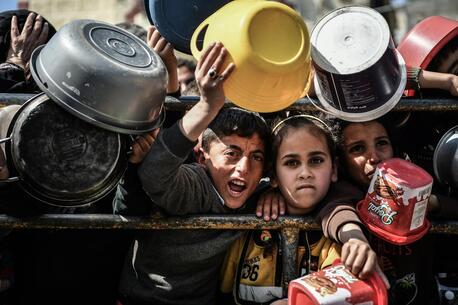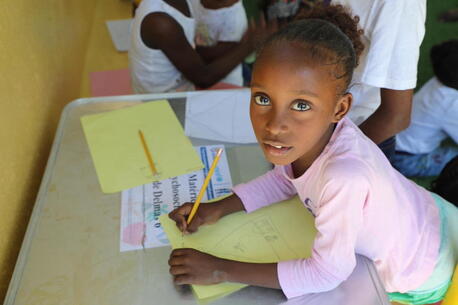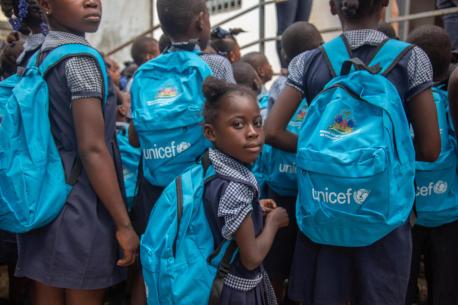
UNICEF's Urgent Appeal to Save Children's Lives in Haiti
UNICEF's emergency response plan for Haiti remains dangerously underfunded. What that plan looks like — and the cost of inaction.
100,000 children's lives at immediate risk
Beset by unrelenting gang violence, political turmoil, economic collapse, a breakdown in basic services and the return of cholera, the situation for children and families in Haiti is now so dire that UNICEF has launched an organization-wide mobilization alongside an urgent appeal for funds.
Without immediate action, officials say, more than 100,000 children are at risk of immediate death.
“Conditions for children and families in Haiti are the worst they have been in living memory,” Bruno Maes, UNICEF Representative in Haiti, said recently. “Life has become untenable for families who just want their children to be safe, to be able to go to school and to have futures they can look forward to.”
Poverty, malnutrition, displacement endangering children and families
The island nation of almost 12 million has been spiraling inexorably towards anarchy since the July 2021 assassination of President Jovenel Moïse. Since then the country has been in a protracted political crisis, with a rise in armed groups, gang-related violence and a level of civil unrest that has brought economic activity to standstill and triggered a mass exodus of the nation’s professional class.
The situation has now reached a critical point. Today nearly 60 percent of the population is living below the poverty line. At least 160,000 people have been internally displaced. In April alone, more than 600 people were killed in Haiti's capital, Port-au-Prince.
More than 4 million children are in urgent need of humanitarian support to combat malnutrition and restore access to education, protection and basic services. The number of children suffering from severe wasting, or severe acute malnutrition (SAM), has risen by 30 percent since 2022 – with 115,600 expected to suffer from the condition in 2023, compared to 87,500 last year.
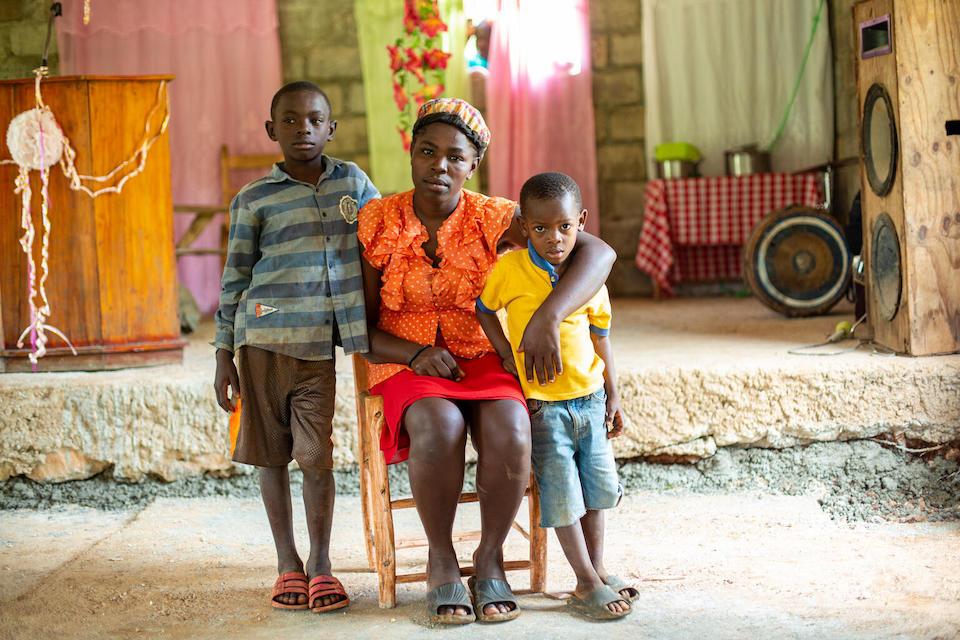
In April the Ministry of Health reported 40,648 suspected cholera cases that month — nearly half of them children under the age of 14 — posing another dire threat as the nation enters hurricane season amid a shortage of health workers and a critical lack of supplies across the vast majority of health facilities.
“Parents cannot take their children to health centers due to increasing horrific violence caused by armed groups,” Maes says. “Combined with the ongoing cholera outbreak, more children are suffering from severe wasting more rapidly, and will die if urgent measures are not taken.”
But the situation is not hopeless. UNICEF has been able to provide basic services in a variety of settings — helping more than 393,000 people gain access to safe water, for example, and treating almost 3,000 children for wasting.
As needs continue to escalate, these and other emergency interventions must be scaled up.
Despite the unrest, with support, UNICEF can deliver — even in hard-to-reach areas
In early spring of 2023, a high-level mission of emergency directors from several UN organizations and NGOs conducted an assessment. The delegation found that the situation on the ground was sufficiently catastrophic to warrant the highest level of humanitarian priority.
Members of the delegation also held meetings with some of the local players on the ground and determined that despite the unrest, it would be possible to get the access needed to deliver aid and services to hard-to-reach areas in crisis.
UNICEF then scaled up its emergency activation to a Level 3, the organization’s highest emergency activation level – placing it on par with the recent earthquake disaster in Syria and Türkiye and the drought crisis in the Horn of Africa. It began a staff “surge” and launched a global appeal for the resources needed to massively scale up in-country efforts.
An appeal to fill an enormous funding gap for humanitarian action in Haiti
To respond effectively to the needs in 2023, UNICEF estimates it will need $210.3 million. As of May, the appeal still had a funding gap of 89 percent, or $187 million.
Most urgently, UNICEF needs $17 million to scale up early detection of child wasting; procure an additional 84,000 cartons of Ready-to-Use Therapeutic Food (RUTF); and deliver a comprehensive package of nutrition, health, WASH, early childhood development (ECD) and child protection interventions.
Failure to fill the funding gap would be catastrophic, UNICEF warns.
Important aspects of UNICEF's 2023 action plan for Haiti is to keep working to improve access to and continuity of essential services — including those critical for containing the spread of cholera — and to continue strengthening disaster risk reduction and preparedness.
UNICEF is also focused on meeting the needs of children and families internally displaced by violence — and reaching those unable to leave dangerous areas with emergency support; deploying and equipping mobile health and nutrition teams; distributing critical supplies; and promoting community engagement, ownership and resilience.
Humanitarian cash transfers will also be provided to improve access to basic goods and services.
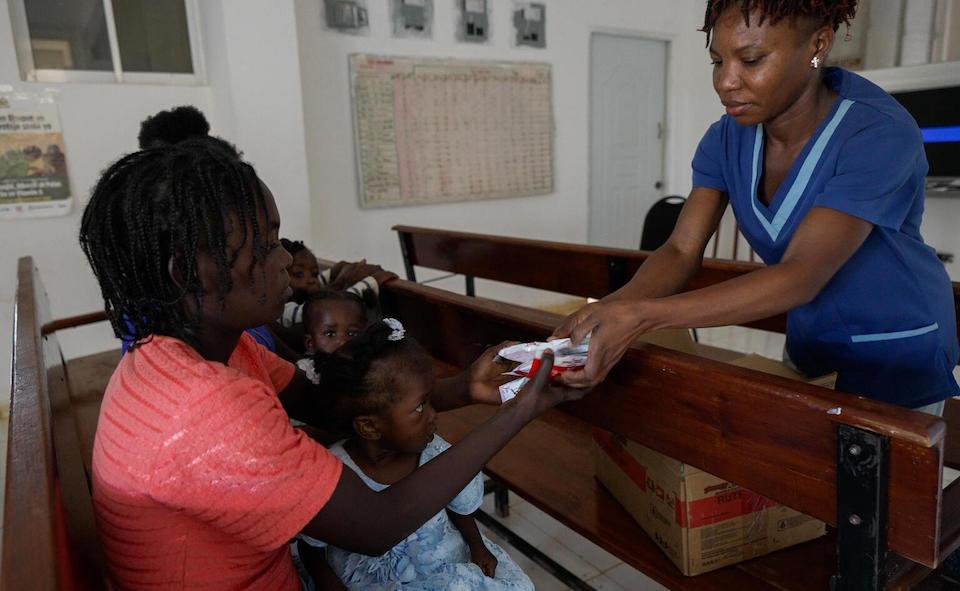
Specific targets for UNICEF's response in Haiti include:
- screening 600,000 children for wasting
- providing 467,175 caregivers with counseling on infant and young child feeding
- vaccinating 162,400 children for measles
- providing health care in UNICEF-supported facilities to 652,200 women and children
These efforts are well underway, and teams are getting results — while also looking for ways to expand their reach.
Here's a look at UNICEF's impact so far in a few key program areas.
Strengthening the cholera response
UNICEF is working with the Ministry of Health and 20 partners to find each case household and cordon the surrounding households with integrated interventions such as infection prevention and control, immunization and community awareness.
Through Rapid Response Teams, UNICEF has treated about 158,000 people in their homes with 53,200 UNICEF cholera kits. Since the start of the outbreak, UNICEF has procured and delivered 6.8 million water treatment tablets, 341,000 pieces of soap and 8,000 sachets of oral rehydration salts, reaching about 400,000 people.
Providing basic health care
UNICEF has distributed medical kits and equipment for essential care including kits for safe birth deliveries and has reached over 36,000 children with crucial immunizations.
With fuel costs skyrocketing, a major service disruption, UNICEF has provided 15,000 gallons of fuel to enable five hospitals to continue services for over 45,000 children and women.
With UNICEF support, over 400 health care workers have been hired – including 200 doctors and 205 community health workers.
Reaching children with nutrition support
More than 100,000 children have been screened for wasting, and 2,936 children treated.
To extend this support into additional crisis areas, UNICEF has established new partnerships in Delmas and Port-au-Prince and developed and disseminated guidelines on how to manage child wasting and cholera cases across the country.
Overall, 25,000 children have received support to prevent or treat malnutrition, while over 30,000 caregivers were provided with counseling on infant and young child feeding.
Strengthening child protection against violence, exploitation and abuse
Already this year, 21,000 people have accessed services for gender-based violence response and prevention, such as access to temporary shelter, case management, medical care and information on the risk of gender-based violence and available services.
In border areas with the Dominican Republic, 768 unaccompanied or separated children received full services, including alternative care transit centers, or were reunified with their family.
More than 20,000 people were provided with information to prevent of family separation, exploitation and child trafficking.
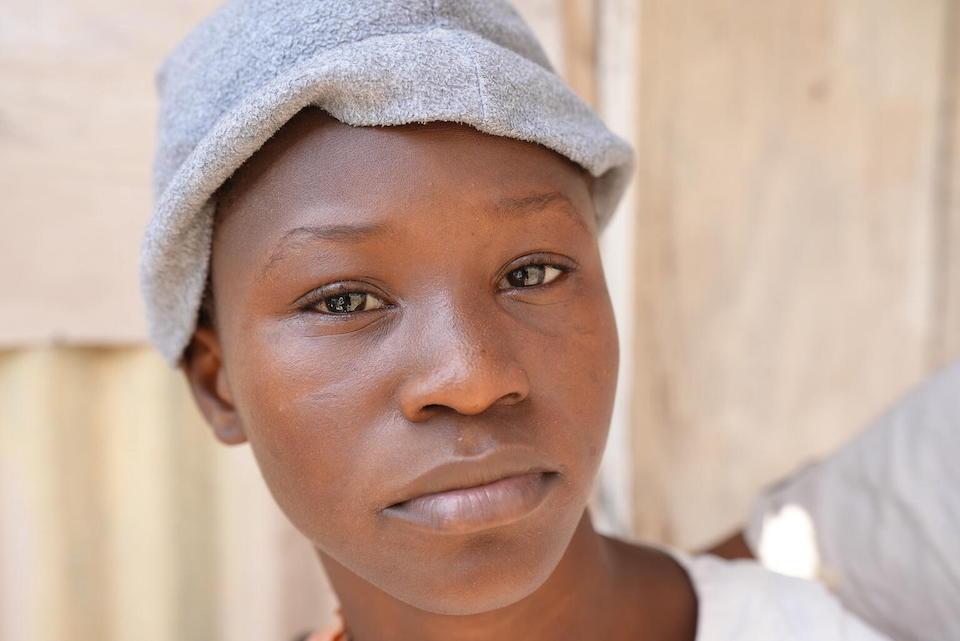
Providing safe water, sanitation and hygiene (WASH) services
Since January, water trucking has brought clean water to over 393,000 people living in sites for the internally displaced. In the West, South and Central regions, chlorination was provided to 122 water supply systems to prevent the spread of cholera.
Critical WASH supplies (menstrual health materials, water-treatment chemicals, soap, buckets and collapsible jerry cans) have helped 198,000 people in Port-au-Prince.
Creating opportunities for children to continue their education
With UNICEF support, 10 semi-permanent schools have been constructed in the region that was heavily damaged by the 2021 earthquake, enabling 3,600 children to attend class. Student backpacks containing school supplies, training materials for teachers and hygiene kits have also been distributed.
Help UNICEF reach more children and families in crisis with the support they urgently need. Unrestricted donations gives UNICEF the flexibility to deploy resources where they are needed most in an emergency. Donate today.

